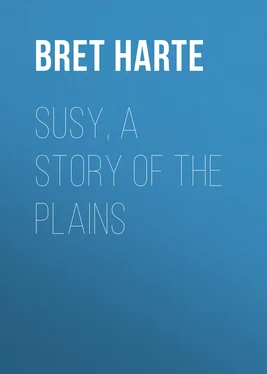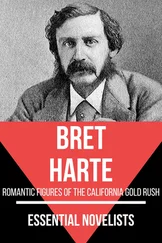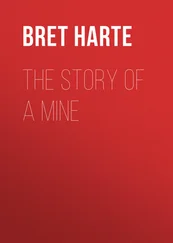Bret Harte - Susy, a Story of the Plains
Здесь есть возможность читать онлайн «Bret Harte - Susy, a Story of the Plains» — ознакомительный отрывок электронной книги совершенно бесплатно, а после прочтения отрывка купить полную версию. В некоторых случаях можно слушать аудио, скачать через торрент в формате fb2 и присутствует краткое содержание. Жанр: foreign_sf, literature_19, foreign_antique, foreign_prose, на английском языке. Описание произведения, (предисловие) а так же отзывы посетителей доступны на портале библиотеки ЛибКат.
- Название:Susy, a Story of the Plains
- Автор:
- Жанр:
- Год:неизвестен
- ISBN:нет данных
- Рейтинг книги:3 / 5. Голосов: 1
-
Избранное:Добавить в избранное
- Отзывы:
-
Ваша оценка:
- 60
- 1
- 2
- 3
- 4
- 5
Susy, a Story of the Plains: краткое содержание, описание и аннотация
Предлагаем к чтению аннотацию, описание, краткое содержание или предисловие (зависит от того, что написал сам автор книги «Susy, a Story of the Plains»). Если вы не нашли необходимую информацию о книге — напишите в комментариях, мы постараемся отыскать её.
Susy, a Story of the Plains — читать онлайн ознакомительный отрывок
Ниже представлен текст книги, разбитый по страницам. Система сохранения места последней прочитанной страницы, позволяет с удобством читать онлайн бесплатно книгу «Susy, a Story of the Plains», без необходимости каждый раз заново искать на чём Вы остановились. Поставьте закладку, и сможете в любой момент перейти на страницу, на которой закончили чтение.
Интервал:
Закладка:
Bret Harte
Susy, a Story of the Plains
CHAPTER I
Where the San Leandro turnpike stretches its dusty, hot, and interminable length along the valley, at a point where the heat and dust have become intolerable, the monotonous expanse of wild oats on either side illimitable, and the distant horizon apparently remoter than ever, it suddenly slips between a stunted thicket or hedge of “scrub oaks,” which until that moment had been undistinguishable above the long, misty, quivering level of the grain. The thicket rising gradually in height, but with a regular slope whose gradient had been determined by centuries of western trade winds, presently becomes a fair wood of live-oak, and a few hundred yards further at last assumes the aspect of a primeval forest. A delicious coolness fills the air; the long, shadowy aisles greet the aching eye with a soothing twilight; the murmur of unseen brooks is heard, and, by a strange irony, the enormous, widely-spaced stacks of wild oats are replaced by a carpet of tiny-leaved mosses and chickweed at the roots of trees, and the minutest clover in more open spaces. The baked and cracked adobe soil of the now vanished plains is exchanged for a heavy red mineral dust and gravel, rocks and boulders make their appearance, and at times the road is crossed by the white veins of quartz. It is still the San Leandro turnpike,—a few miles later to rise from this canada into the upper plains again,—but it is also the actual gateway and avenue to the Robles Rancho. When the departing visitors of Judge Peyton, now owner of the rancho, reach the outer plains again, after twenty minutes’ drive from the house, the canada, rancho, and avenue have as completely disappeared from view as if they had been swallowed up in the plain.
A cross road from the turnpike is the usual approach to the casa or mansion,—a long, low quadrangle of brown adobe wall in a bare but gently sloping eminence. And here a second surprise meets the stranger. He seems to have emerged from the forest upon another illimitable plain, but one utterly trackless, wild, and desolate. It is, however, only a lower terrace of the same valley, and, in fact, comprises the three square leagues of the Robles Rancho. Uncultivated and savage as it appears, given over to wild cattle and horses that sometimes sweep in frightened bands around the very casa itself, the long south wall of the corral embraces an orchard of gnarled pear-trees, an old vineyard, and a venerable garden of olives and oranges. A manor, formerly granted by Charles V. to Don Vincente Robles, of Andalusia, of pious and ascetic memory, it had commended itself to Judge Peyton, of Kentucky, a modern heretic pioneer of bookish tastes and secluded habits, who had bought it of Don Vincente’s descendants. Here Judge Peyton seemed to have realized his idea of a perfect climate, and a retirement, half-studious, half-active, with something of the seignioralty of the old slaveholder that he had been. Here, too, he had seen the hope of restoring his wife’s health—for which he had undertaken the overland emigration—more than fulfilled in Mrs. Peyton’s improved physical condition, albeit at the expense, perhaps, of some of the languorous graces of ailing American wifehood.
It was with a curious recognition of this latter fact that Judge Peyton watched his wife crossing the patio or courtyard with her arm around the neck of her adopted daughter “Suzette.” A sudden memory crossed his mind of the first day that he had seen them together,—the day that he had brought the child and her boy-companion—two estrays from an emigrant train on the plains—to his wife in camp. Certainly Mrs. Peyton was stouter and stronger fibred; the wonderful Californian climate had materialized her figure, as it had their Eastern fruits and flowers, but it was stranger that “Susy”—the child of homelier frontier blood and parentage, whose wholesome peasant plumpness had at first attracted them—should have grown thinner and more graceful, and even seemed to have gained the delicacy his wife had lost. Six years had imperceptibly wrought this change; it had never struck him before so forcibly as on this day of Susy’s return from the convent school at Santa Clara for the holidays.
The woman and child had reached the broad veranda which, on one side of the patio, replaced the old Spanish corridor. It was the single modern innovation that Peyton had allowed himself when he had broken the quadrangular symmetry of the old house with a wooden “annexe” or addition beyond the walls. It made a pleasant lounging-place, shadowed from the hot midday sun by sloping roofs and awnings, and sheltered from the boisterous afternoon trade winds by the opposite side of the court. But Susy did not seem inclined to linger there long that morning, in spite of Mrs. Peyton’s evident desire for a maternal tete-a-tete. The nervous preoccupation and capricious ennui of an indulged child showed in her pretty but discontented face, and knit her curved eyebrows, and Peyton saw a look of pain pass over his wife’s face as the young girl suddenly and half-laughingly broke away and fluttered off towards the old garden.
Mrs. Peyton looked up and caught her husband’s eye.
“I am afraid Susy finds it more dull here every time she returns,” she said, with an apologetic smile. “I am glad she has invited one of her school friends to come for a visit to-morrow. You know, yourself, John,” she added, with a slight partisan attitude, “that the lonely old house and wild plain are not particularly lively for young people, however much they may suit YOUR ways.”
“It certainly must be dull if she can’t stand it for three weeks in the year,” said her husband dryly. “But we really cannot open the San Francisco house for her summer vacation, nor can we move from the rancho to a more fashionable locality. Besides, it will do her good to run wild here. I can remember when she wasn’t so fastidious. In fact, I was thinking just now how changed she was from the day when we picked her up”—
“How often am I to remind you, John,” interrupted the lady, with some impatience, “that we agreed never to speak of her past, or even to think of her as anything but our own child. You know how it pains me! And the poor dear herself has forgotten it, and thinks of us only as her own parents. I really believe that if that wretched father and mother of hers had not been killed by the Indians, or were to come to life again, she would neither know them nor care for them. I mean, of course, John,” she said, averting her eyes from a slightly cynical smile on her husband’s face, “that it’s only natural for young children to be forgetful, and ready to take new impressions.”
“And as long, dear, as WE are not the subjects of this youthful forgetfulness, and she isn’t really finding US as stupid as the rancho,” replied her husband cheerfully, “I suppose we mustn’t complain.”
“John, how can you talk such nonsense?” said Mrs. Peyton impatiently. “But I have no fear of that,” she added, with a slightly ostentatious confidence. “I only wish I was as sure”—
“Of what?”
“Of nothing happening that could take her from us. I do not mean death, John,—like our first little one. That does not happen to one twice; but I sometimes dread”—
“What? She’s only fifteen, and it’s rather early to think about the only other inevitable separation,—marriage. Come, Ally, this is mere fancy. She has been given up to us by her family,—at least, by all that we know are left of them. I have legally adopted her. If I have not made her my heiress, it is because I prefer to leave everything to YOU, and I would rather she should know that she was dependent upon you for the future than upon me.”
“And I can make a will in her favor if I want to?” said Mrs. Peyton quickly.
Читать дальшеИнтервал:
Закладка:
Похожие книги на «Susy, a Story of the Plains»
Представляем Вашему вниманию похожие книги на «Susy, a Story of the Plains» списком для выбора. Мы отобрали схожую по названию и смыслу литературу в надежде предоставить читателям больше вариантов отыскать новые, интересные, ещё непрочитанные произведения.
Обсуждение, отзывы о книге «Susy, a Story of the Plains» и просто собственные мнения читателей. Оставьте ваши комментарии, напишите, что Вы думаете о произведении, его смысле или главных героях. Укажите что конкретно понравилось, а что нет, и почему Вы так считаете.












